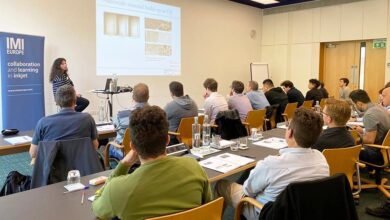Arab Media Forum Opens In Dubai
His Highness Sheikh Mohammed bin Rashid Al Maktoum, Vice-President and Prime Minister of the UAE and Ruler of Dubai, accompanied by His Highness Sheikh Maktoum bin Mohammed bin Rashid Al Maktoum, Deputy Ruler of Dubai, attended today the opening session of the Arab Media Forum 2014.
The 13th Edition of the annual gathering of media personalities from the UAE, the Arab World and the international arena, witnessed a keynote address by H.E the Egyptian Prime Minister Eng. Ibrahim Mahlab.
In her welcome address Mona Al Marri, Director General of the Government of Dubai Media Office (GDMO), welcomed H.H. Sheikh Mohammed bin Rashid and H.E. Eng. Ibrahim Mahlab and guests and delegates.
“First and foremost, allow me to welcome His Excellency the Egyptian Prime Minister Eng. Ibrahim Mahlab to the United Arab Emirates.
“And let me take this opportunity to express gratitude to you, your Highness Sheikh Mohammed, for the Arab Media Forum (AMF) would not have been launched and succeeded so far if it weren’t for your unremitting support and everlasting encouragement for the media, in general, and the Forum, in particular,” the DGMO Director General said.
“In line with your wise directives and care, your Highness, development and innovation became integral parts in our approach to achieve our goals and objectives. Today, we are proud that the AMF won the trust of the Arab media community to become a fixed, annual gathering where media persons interact to discuss truth and reality of their profession, aspects of its progress and aspirations,” she pointed out.
 Al Marri said the two-day Forum is being held amid concerns over the exceptional circumstances afflicting the media in the Arab World and which have laid unprecedented challenges, testing both professionals and media industry.
Al Marri said the two-day Forum is being held amid concerns over the exceptional circumstances afflicting the media in the Arab World and which have laid unprecedented challenges, testing both professionals and media industry.
“Inevitably, these challenges have affected the media in Egypt. Known for its pioneering role in media across the history, the media in Egypt is deemed to play a bigger role in the coming phase.
“We are pleased today to have among us H.E. Eng. Ibrahim Mahlab who will tell us about the media role in forming the new reality of the media in Egypt as well as its role in fostering stability, growth and prosperity towards securing Egypt’s future,” she said.
Need to keep up with changes
In context of rapid changes in media technology and fierce competition, Al Marri said “we are in dire need to keep up with such transformations efficiently. Further, we need to improve performance standards in line with content and be able to interact with the new players of the digital media. “
The theme “The Future of Media Starts Today” opted for AMF’s 13th edition was chosen to remind all that media plays a vital role in making the future.
“And in order to be prepared for and be able to anticipate the future, we need to be optimistic, think in a futuristic manner and focus on what is required tomorrow rather than what should have been done yesterday; and with confidence and resilience be able to face the challenges ahead,” DGMO Director General Mona Al Marri advised.
The 13th Arab Media Forum gathered approximately 2000 media leaders, key writers and industry specialists from around 27 countries from the Arab World and beyond to discuss current challenges facing the media industry and means to overcome them towards enhancing the media output.





